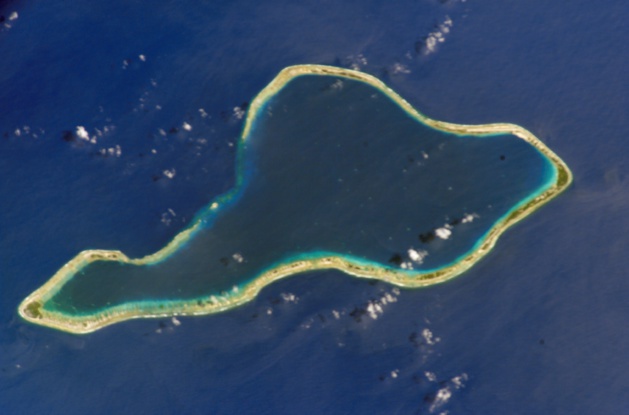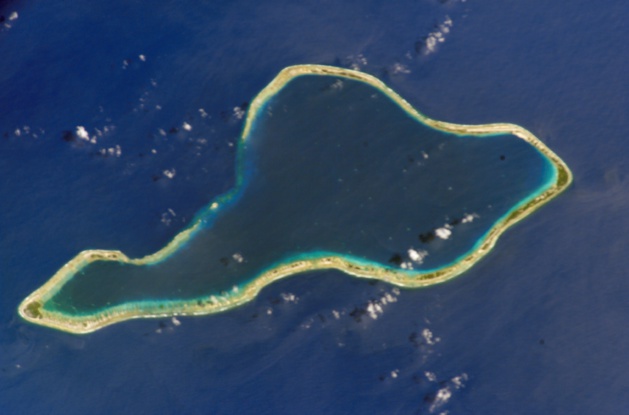
The Mururoa Atoll-Photo Credit: NASA
The Carteret Islands are experiencing the effects of erosion, and almost nothing can withstand the forces of the sea. Only Han, the main island, resists as it is partially covered by trees. The other islands, which aren’t, are completely exposed to floods. In this way, the sea is taking back its rights piece by piece, level by level, on what is-or was-the atoll. Seeing that the highest point of these islands is one and a half metres over sea level, the threat is considerable. The rate of these floods was measured by the National Tidal Facility, an Australian research centre. The result: the level increases from 5.6 to 8.2mm per year. But what does this mean for the inhabitants of the Carteret Islands?
The first climate refugees
For them, the consequences of the changes are drastic and force them to abandon their country and settle elsewhere. To avoid this, they are trying to struggle to prevent submersion. The islanders build walls and plant mangroves, without success. The total evacuation began five years ago and the most negative scientists’ predictions say that the Carteret Islands will completely disappear under the water this summer. It is in this way that a few hundred people, with one of the lowest environmental footprints in the world, paradoxically are becoming the first climate refugees.
It is precisely the rising sea levels that have forced them to take refuge elsewhere. Where does this change come from? It is directly linked to global warming. But in addition to the melting of the continental glaciers, it is simple physical laws that are the cause of this development, more precisely called laws of thermal expansion. More exactly, because of the rising temperature of the oceans, the water molecules move about more and separate from one another: the volume of water increases, the sea level rises, and an entire people become stateless.
Tuvalu and the struggle against the sea level
East of the Carteret Islands, the struggle against submersion continues: the Polynesian archipelago of Tuvalu is organising a global campaign so that the precarious situation will not fade into obscurity. With Project 10,000, they aim to film an interview and shoot a photo with every one of the 10,000 habitants of their little nation. The results are displayed around the world: the project aims to advance the knowledge and understanding of the effects of global warming. At the same time, the organisers are taking measures in Tuvalu. They are repairing the water distribution system, destroyed by saltwater, and planting mangroves which counteract erosion.
Getting international attention
Project 10,000 is not the only action being taken by the Pacific Islanders: in 2011, the subject was even brought up at the Oscars: The production Sun Comes Up almost won the Academy Award for best documentary. The film accompanies the Carteret Islands inhabitants on their voyage, searching for a new homeland.
Last year, at the United Nations Climate Summit, the young Marshallese writer Kathy Jetnil-Kijner called for action with a poem addressed to her daughter. She stimulated discussion on the islands for following generations. The author herself knows of the effects of floods. Only a few days after the summit, she wrote on her blog: “Last Friday, we received a high tide alert at five in the afternoon. What was no more than a simple high tide transformed in movements and giant waves that swallowed the docks, flooding and damaging the houses and streets.”
Even if all these stories of archipelagos in the Pacific seem far from our world, they are nearer than we may realize: every time we open a webpage of a tv channel with the domaine .tv, it is a page linked by the Tuvalu government to a television company. What will be made of this domain name when Tuvalu has disappeared under the ocean is a very complex legal question. Noataga, a fisherman from Tuvalu, made a very simple demand to us: “I like life on this island. It is my dream to spend my life here and to die here. Please, help me realise this dream.”




























